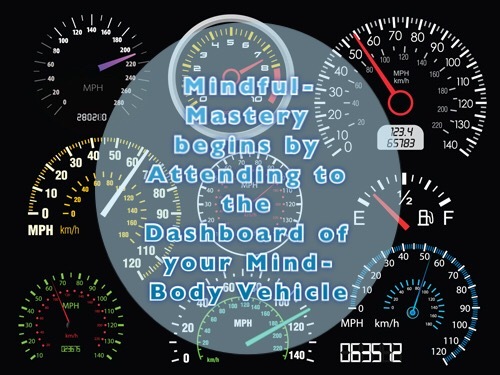
One of the basic premises of Mindfulness based teachings is that humans, naturally and automatically, cling to pleasure and avoid pain. This causes us to suffer needlessly. While some pain in our lives is unavoidable, suffering is optional. But, because of the way our minds and bodies are wired, we unconsciously do things that add suffering, in the pursuit of not feeling the pains of life. The result is, we get stuck, or off track in your life and goals.
The good news is that the science of being human has clarified a lot in recent decades. We know more than ever about our basic programing, and how it interacts with experience, to create learned patterns of coping: our auto-pilot way of being. In the most simplistic terms, the goal of mindfulness-based CBT (Cognitive Behavioral Therapies) is to help you figure out the elements of the following equation:
Past experiences + Hardwiring = Programing → Current ways of reacting and behaving in the world.
This process of discovery is a collaborative endeavor. You are the expert in you and you're past experiences. The therapist is the expert in hardwired human processes and how they can go awry, to get you off track towards your goals. This being the case, your unique experiences are the essential ingredients, which must be added to the recipe for how all humans function. As Margaret Mead stated so eloquently, "you are absolutely unique, just like everyone else."
Once this first equation is determined, the next step is to provide you with the skills you need to get out of auto pilot reactivity and into more mindful adaptive responses to your life and goals. So, the whole process can be boiled down to a simple "what?" "why" and "HOW," and looks something like this:
What: Your story + Why: Basic human processes = Auto-pilot + How: Mindfulness & Skills → Mastery
Everyday I help people negotiate the terrain of pursuing their dreams, and managing the inherent difficulties of doing so. Both in my private practice and in supervising graduate students, I guide students through the process of learning the practices and skills needed to be; a. More mindfully aware of what they bring to the equation, b. why the normal workings of the mind-body system can get us stuck in unhelpful auto-pilot mode, and c. HOW to develop mastery and more skillful responding.
What's Your Story?
How does it feel to be you? What are the most memorable events in your life? What have your relationships been like? What are your successes and failures? As you have traveled the road of life, you have collected experiences, from which you have derived ideas about how the world works. These are the essential ingredients each client brings to me to help them move towards their goals. It is your combination of strengths and weaknesses, traits, and experiences, which make your story unique.
Your Mind-Body Vehicle
At the same time, that mind-body system, in which you inhabit right now, is just like everyone else. While your life experiences and predispositions may be unique, all humans are subject to the same basic operating system of our mind-body vehicles. Just as there are countless types of cars on the road (with various abilities), they all have an engine, steering wheel, and tires. Just the same, our mind-body vehicles have emotions, thoughts, and action tendencies. Each component interacts with the other to influence how the vehicle reacts to the road. So, what you do and how you think will affect your emotions; your emotions will affect your thinking and actions, etc.
My job is to help clients plug their story into this system and build their awareness of situations and reactions, which signal to them that they are caught in the system. Each client learns this from a series of experiential practices and weekly submission of experience logs, which I call the Dashboard form. As in, reading the dashboard of your mind-body vehicle. This builds the ability to recognize that you have been triggered into auto-pilot reactivity, rather than responding objectively to the situation.
Mindful-Mastery Skills to combat Auto-Pilot
From the mindfulness exercises and experience logs, we find themes of auto-pilot reactivity. This awareness helps to get space between the experience of being triggered, and the reaction to it. But as the old adage goes, "awareness is [just] the first step." Mindful-Mastery emphasizes the essence of the common elements of evidence supported mindfulness treatment: balancing acceptance and change. Accepting things as they are, while changing what you can. But you have to know HOW to respond.
It's a bit like knowing your car pulls to the left when you hit a speed bump. Just knowing this is not enough. You also have to take the action of pulling the steering wheel a bit to the right to ensure your car continues straight ahead. The HOW of skillfully managing our internal reactions is the most nuanced and challenging part. Unlike, "pulling to the right" when your car is out of alignment, this process is anything but intuitive. In fact, it is the opposite of intuitive, because of the hardwiring of the mind-body system. Our thoughts and beliefs feel true! Our emotions are programed for us to react quickly.
Each of us is on a unique life path, but there are rules on the road, which apply to all of us. When the roads get bumpy, or changes dramatically, a new level of skillfulness is needed. Like any new skill, to become masterful will come with experience, and practice, practice, practice!
